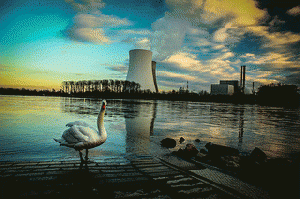The swan in front of a nuclear power station by FarbenfroheWunderwelt
Tens of thousands of demonstrators took to the streets in Tokyo on Saturday carrying banners reading, "No nukes" and, "Save the children". They were protesting two days before the second anniversary of the meltdowns at the Fukushima Da-ichi power plant, which resulted from the March 2011 earthquake and tsunami.
"I am going to fight against those who act as though Hiroshima, Nagasaki and Fukushima never happened," Nobel Prize-winning author Kenzaburo Oe told the Tokyo crowd. A class action suit involving 800 plaintiffs was filed Monday demanding that the government and Tokyo Electric Power Company (TEPCO), which operated the Dai-ichi facility, restore the natural environment and people's homes to their pre-disaster state.
The Fukushima site remains one of the most radioactive places on earth, and the devilishly difficult cleanup there is expected to take 40-plus years and cost tens of billions of dollars. Some 160,000 evacuees still live in temporary housing, having lost their livelihoods and land to the contamination, which may render some of it unfarmable for centuries to come.
In response to the accident, Japanese authorities shut down the nation's 54 nuclear power plants, a popular move in a country that lost two of its cities to atomic bombs at the end of the last World War, and where anti-nuclear sentiments run deep. But in the face of power shortages and mounting industry pressure, oil and coal-poor Japan, has begun re-opening its closed nuclear facilities and plans to restart six more reactors by the end of 2013. The pro-nuclear government of Prime Minister Shinzo Abe, who took office in December, has even talked about building new plants.
This gradual return to business as usual has led some to question how much has been learned from Fukushima.
Not much, if one believes a commentary published in Bloomberg View on Sunday which trumpets, "Fukushima Radiation Proves Less Deadly Than Feared". Professor Robert Peter Gale and author Eric Lax argue that more people die from air pollution created by oil and coal-fired power plants than from radiation released during nuclear accidents.
Their takeaway from the second largest nuclear accident in history (after Chernobyl) is that outside of the badly contaminated plant site and the temporary dislocation of the area's residents, not much harm was done. Public "fears of health risks from radiation," they concluded, "have little basis in fact."
The Japanese government has also been eager to play down Fukushima's impact. Critics charge that after the accident the authorities were slow to extend the narrow exclusion zone around Fukushima, and withheld critical information about contamination levels, which delayed the evacuation. The New York Times reported:
"After the nuclear disaster, the government raised the legal exposure limit to radiation from one to 20 millisieverts a year for people, including children -- effectively allowing them to continue living in communities from which they would have been barred under the old standard."
The truth is that nobody can say yet what the effect are of the Fukushima accident on public health in Japan and beyond. Typically, chronic illnesses, like cancer and Leukemia which are associated with radiation, take several years after exposure to appear. But a report released in late January gives early cause for concern. The Fukushima Prefecture Health Management Survey revealed that 44.2% of 94,975 children tested by ultrasound had small thyroid nodules and cysts, which may in some cases be a precursor of cancer. The number of abnormalities has been increasing over the past two years that the surveys have been conducted.
Scientists at Stanford University estimated that the radiation from the meltdown might result in -- at the upper limit -- as many as 2,500 additional cancer cases (mostly in Japan) and 1,300 cancer deaths globally. Last year's study, which used 3D global atmospheric modeling, predicted that the impact would have been ten times greater if the prevailing winds had not swept most of the radiation relatively harmlessly out to sea. "There was a lot of luck involved," said Mark Z. Jacobson, co-author of the report.
Should America be depending on luck to protect us from potential future Fukushimas? Not according to Edwin Lyman, a senior scientist at the Union of Concerned Scientists. Lyman told me that after Fukushima, the Nuclear Regulatory Commission (NRC) set up a task force to identify the lessons the US should learn from the accident. The task force recommended, among other things, that nuclear plants should upgrade their ability to deal with extended power outages, such as occurred at Fukushima, without their reactor cores melting down.
But the nuclear industry balked at the proposed new NRC regulations and proposed its own voluntary program dubbed "FLEX" (Diverse and Flexible Coping Strategies) instead. Lyman says that FLEX, which involves purchasing more reliable equipment, and sprucing up emergency backup systems, is a step in the right direction. But he believes that it is not nearly as stringent as it needs to be to prevent future Fukushimas. The nuclear industry is lobbying the NRC to accept the FLEX programs "half measures," according to Lyman, in lieu of the tough new regulations that its own task force devised.
And there is growing pressure from Congress to comply. Michigan Republican Fred Upton, chairman of the House Energy Committee, whose biggest campaign contributors include several nuclear and electric industry pacs, is one of the leaders of the move to get regulators to sign off on the industry plan.
Ironically, Upton's district includes the Palisades nuclear power plant located on the shores of Lake Michigan, an aging facility that has been notorious for a series of shutdowns, leaks, and equipment failures in recent years. The facility suffered three "near misses" in the past three years.
(Note: You can view every article as one long page if you sign up as an Advocate Member, or higher).





